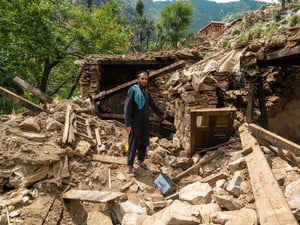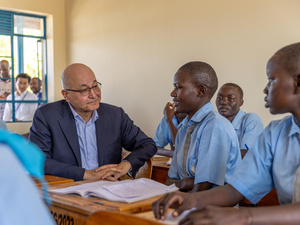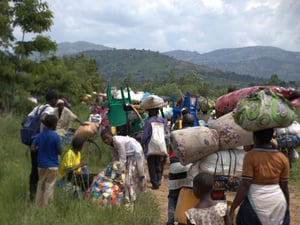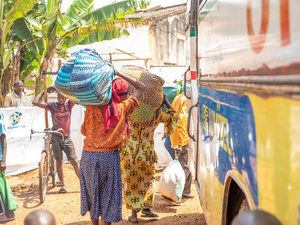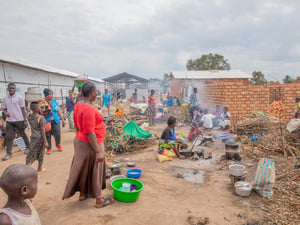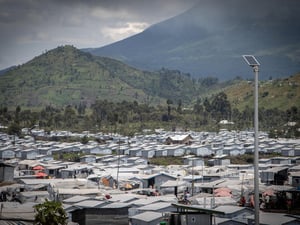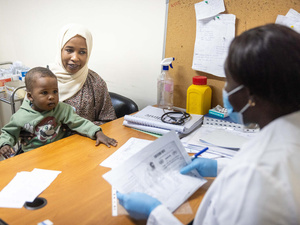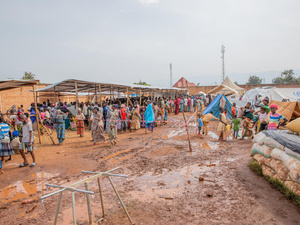Congolese refugees in Burundi transferred away from volatile border region
Congolese refugees in Burundi transferred away from volatile border region

Congolese refugees fleeing to Burundi cross the bridge at Gatumba, October 2002.
BUJUMBURA, Burundi, Dec. 17 (UNHCR) - Aid workers in Burundi have begun the transfer of more than 7,000 Congolese refugees from makeshift sites in the volatile border area to a new camp in Cishemeye, some 70 km north of the capital, Bujumbura.
The transfer got underway last week as the first group of 130 refugees travelled from the border site at Gatumba to Cishemeye. Refugees at the temporary border sites at Gatumba and nearby Rugombo are part of a group of nearly 15,000 Congolese who fled as heavy fighting erupted in mid-October for the control of the town of Uvira - a local hub on the Democratic Republic of the Congo (DRC) side of Lake Tanganyika.
The fighting pitted Mai-Mai rebels against the rebel Congolese Rally for the Return to Democracy (RCD-Goma). Most of those fleeing sought refuge in Burundi, but some also fled to the southern Rwanda town of Cyangugu and to the neighbouring Kigoma area of western Tanzania. More than half of those who fled to Burundi have since gone back home, but up to 7,000 remain in the volatile border zone.
Even as the transfer inland began, a small but steady trickle of new refugees continued from the south Kivu region of the DRC. Since November 20, more than 1,000 refugees have arrived from Burundi. Most of the new arrivals will also be transferred to the new camp north of Bujumbura.
Many of the refugees who recently arrived in western Burundi say their homes in Uvira remain unsafe, particularly at night. They allege that Mai-Mai militia and rebels of the Burundi Front National Pour La Libération (FNL) who also operate in south Kivu, raid homes and loot provisions and other property from town residents. One such raid by Burundi rebels on December 3 left 18 people dead in the small village of Kiliba close to Uvira. The rebels are said to have killed the villagers in retaliation for the alleged killing of some rebel fighters in the area. Some refugees said they fled because they were unable to go to their rice fields on the Rusizi Plains during the day for fear of attacks by rebels.
Last month, refugees living in the makeshift sites in Burundi were informed of the options open to them. Those who felt that conditions in south Kivu were adequate for return were invited to do so. Those who chose to remain in Burundi were given the option of transferring to other camps in safer areas of the country. The people who found accommodation outside refugee camps were told that they were required by the Burundi authorities to report to the department for immigration services to obtain the needed identity papers.
Meanwhile, RCD-Goma officials have been visiting the border sites in Burundi to persuade refugees to return home. During their last visit, on December 7, the officials came with several buses from Uvira to take willing refugees back to south Kivu. They argued that refugees should return to ensure that their children go back to school in January. Refugees at Rugombo declined to leave, saying they preferred to wait and see how the situation develops in south Kivu. But they allowed herders to drive back 1,000 head of cattle to pastures on the Rusizi Plain, across the Rusizi River which separates Burundi and eastern DRC. At another camp, RCD-Goma officials managed to persuade a group of refugees to go back with them.

